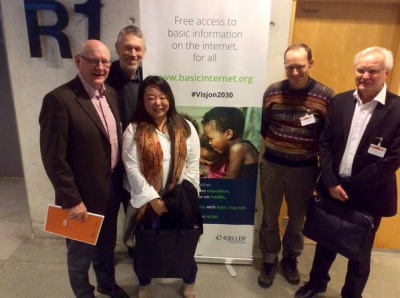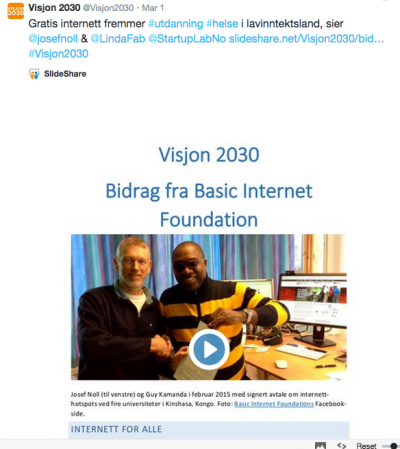Difference between revisions of "Template:BIF Visjon2030"
Josef.Noll (Talk | contribs) |
Josef.Noll (Talk | contribs) |
||
| Line 6: | Line 6: | ||
== Concept == | == Concept == | ||
| − | The Basic Internet core infrastructure is designed to transit text and images in a compressed form. The key performance is to support low capacity Internet connections, which is essential when using satellite or low-bandwidth aerial connections. The Basic Internet technology supports 400 to 600 simultaneous users to access Information over a thin 1 Mbit/s link | + | The Basic Internet core infrastructure is designed to transit text and images in a compressed form. The key performance is to support low capacity Internet connections, which is essential when using satellite or low-bandwidth aerial connections. The Basic Internet technology supports 400 to 600 simultaneous users to access Information over a thin 1 Mbit/s link. Connection that many people simultaneously is radically more than what can be achieved through conventional browsers, enabling the use of satellites to connect to many users in hotspots. |
| − | + | ||
| − | + | The concept is tailored to provide a basic access to the Internet for schools and population where the Internet does not exist today, or where ordinary connection is too costly. The cost-effective Basic Internet can therefore deliver ''(i)'' adapted capacity to the Internet to schools and ''(ii)'' facilitate proper and effective content together with other actors. In addition, ''(iii)'' solutions for video and streaming to specific terminals are provided e.g. to schools, when desired. | |
| + | |||
| + | The concept and the coverage can easily be adapted and extended to apply in other areas than school education, being health, agriculture or innovation support. As such the Basic Internet concepts supports fully the requirements mentioned by the [https://www.regjeringen.no/nb/aktuelt/satsing-global-utdanning/id762911/ Norwegian Parliament Announcement Nr. 25 (''Stortingsmelding 25'', 2014)] on 'Development for Education'. | ||
| + | |||
| + | The Basic Internet concept might also be used to solve congestion problems in other networks, e.g. schools, supporting an affordable, if not free, access to basic information. We have started a dialogue with schools to pilot the basic information access. | ||
| + | |||
| + | The required local equipment is kept technologically easy. PCs, Laptops, smart phones and tablets can be connected. Even low-end tablets, pre-installed with the Norwegian Opera Mini browser, | ||
==Konseptet== | ==Konseptet== | ||
Revision as of 21:10, 19 March 2015
Basic Internet (#Basic4all) contributs to the Norwegian Visjon2030, a nationwide collaboration to support the United Nation's development goals for 2030.
Basic Internet's contribution to Vision 2030
The Basic Internet Foundation (BI) and the Basic Internet AS, founded by the University Graduate Centre at Kjeller (UNIK) and Kjeller Innovasjon in 2014, provides free basic access to the Internet, focussing on optimised digital content for people with low income, in areas with low or no Internet coverage, or to areas with high demand.
The Basic Internet Foundation assists organisations and companies to adapt and disseminate information that provide self-help. Services may include educational systems, health care, agricultural information, innovation, banking or other services that contribute to increased welfare and value creation.
Concept
The Basic Internet core infrastructure is designed to transit text and images in a compressed form. The key performance is to support low capacity Internet connections, which is essential when using satellite or low-bandwidth aerial connections. The Basic Internet technology supports 400 to 600 simultaneous users to access Information over a thin 1 Mbit/s link. Connection that many people simultaneously is radically more than what can be achieved through conventional browsers, enabling the use of satellites to connect to many users in hotspots.
The concept is tailored to provide a basic access to the Internet for schools and population where the Internet does not exist today, or where ordinary connection is too costly. The cost-effective Basic Internet can therefore deliver (i) adapted capacity to the Internet to schools and (ii) facilitate proper and effective content together with other actors. In addition, (iii) solutions for video and streaming to specific terminals are provided e.g. to schools, when desired.
The concept and the coverage can easily be adapted and extended to apply in other areas than school education, being health, agriculture or innovation support. As such the Basic Internet concepts supports fully the requirements mentioned by the Norwegian Parliament Announcement Nr. 25 (Stortingsmelding 25, 2014) on 'Development for Education'.
The Basic Internet concept might also be used to solve congestion problems in other networks, e.g. schools, supporting an affordable, if not free, access to basic information. We have started a dialogue with schools to pilot the basic information access.
The required local equipment is kept technologically easy. PCs, Laptops, smart phones and tablets can be connected. Even low-end tablets, pre-installed with the Norwegian Opera Mini browser,
Konseptet
Konseptet Basic Internett er designet for å overføre tekst og bilde. Nøkkelen ligger i at konseptet bruker lav kapasitet, hvilket er essensielt ved bruk av satellitt. Teknologien tillater ved simultan bruk mellom 400 og 600 brukere på 1 MB/s, hvilket er radikalt flere enn ved bruk av en standard nettleser. Dette muliggjør bruk av satellitt for å koble til mange brukere i et område hvor det kan knyttes en eller flere WiFi-soner til satellittmottaket.
Konseptet er skreddersydd for å gi en basis tilgang til Internett for skoler og befolkning der Internett ikke finnes i dag, eller der ordinær tilknytning er for kostbart. Kostnadseffektivt kan BI derfor levere 1) tilpasset kapasitet til internett til skoler og 2) tilrettelegge riktig og virksomt innhold sammen med andre aktører. I tillegg kan 3) løsningen åpne for video/streaming til spesifikke terminaler, f.eks. for en skole, når dette er ønsket. Konseptet/dekningen kan enkelt tilpasses/utvides til å gjelde andre områder enn skole/undervisning, f.eks. helse, landbruk og opplysning. Etter å ha blitt kjent med Stortingsmelding 25, kunne vi til vår overraskelse registrere at konseptet nærmest er skreddersydd for Stortingsmeldingen. For øvrig kan det tilføyes at konseptet også kan løse flaskehalsproblemer også for skoler i bla. Norge. Dialog med skoler for å teste konseptet i Norge er påbegynt.
Lokalt utstyr er enkelt teknologisk sett. PC, smarttelefoner og nettbrett kan tilkobles. Enkle nettbrett kan skaffes meget rimelig ferdig installert med norske Opera Mini som nettleser. Andre nettlesere vil kunne avvises, og Opera Mini kan enkelt lastes ned til terminaler hvor Opera Mini ikke er installert. Knutepunkt/kontroll samt teknologi/utstyr er alt på plass i Norge (Kjeller) – også for styring av økt kapasitet til spesifikke brukere/terminaler og bruk av andre nettlesere. Dette kan avregnes hvis ønskelig. Mulighet for styring slik som sperring av IP-adresser osv. kan også gjøres fra Norge.
Delivery
Basic Internet kan Implementeres i dag og kan skaleres tilpasset behov og ressurser. Nettilgang er det grunnleggende elementet for å kunne benytte og utnytte digital teknologi og innhold. Det fullstendige bildet av hvordan verden og IKT ser ut i 2030 kan ingen spå, men vi kan være med på utviklingen, og vi leverer nøkkelen nå. Basic Internet er et resultat av utvikling i et av Norges fremste universitets- og innovasjonsmiljø. Vår spådom er at videre utvikling og virkeliggjøring av visjoner vil skje i slike klynger av akademiske miljøer som har båret frem og støtter Basic Internet.
Download our contribution (.pdf in Norwegian) or on slideshare.net

